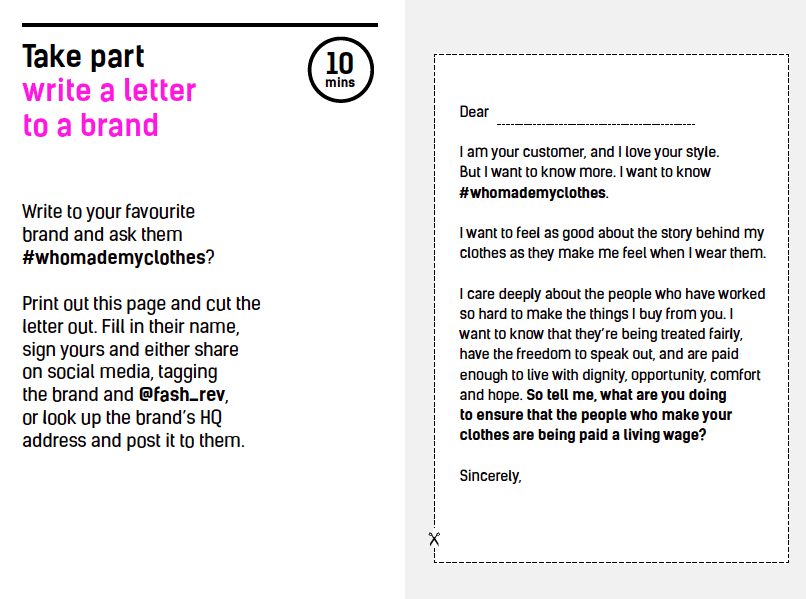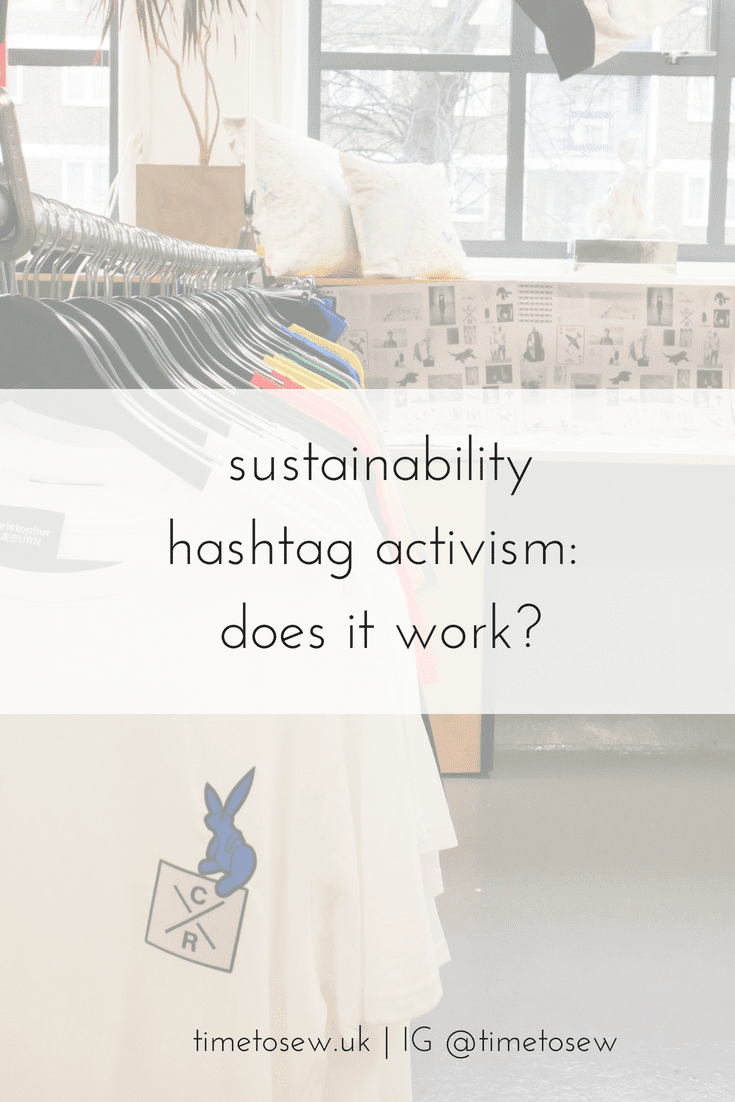There are lots of people with “there are no Planet B” t shirts but they don’t take it seriously.
– Evelyn Mora, founder of Helsinki Fashion Week
This was my favourite quote from a recent Wardrobe Crisis podcast by Clare Press. It had me thinking – there are so many social media movements out there on every topic to get the general public to get involved in a cause! On the sustainability front, #plasticfreejuly was a big one that went viral. And don’t forget #fashionrevolution week (a biggie for me – I wrote about that here), #worldenvironment day, #earthday. If you google you will find many sites (including wiki) which has a calendar of different awareness days. I’m sure that if we added up all of the ones on every site, the entire calendar will be filled up with one thing or another.
But why a day or a week? Do you think these awareness raising days actually promote long lasting change? Or do they simply make us feel better and more engaged on a temporary basis? To me its a bit like going on a diet. Unless you are seriously determined to make long lasting change its easy to slip back into old habits once you’ve done what the hashtag asked. Then for the rest of the year (or until the next hashtag) leave the noisier and louder activists who organise this stuff for us to do the heavy lifting.
Hashtag calls to action
The call to action for any hashtag need to be simple and doable. For my own #makeyourstash with Pilar, we wanted something understandable and obvious that would maximises participation, and be value adding for the individual. (If you participated and it delayed you from buying one piece of fabric, then that is already great as far as we are concerned!)
On a larger scale, Fashion Revolution has a pro forma letter for people to copy paste and send to a brand. But how effective is it if a company suddenly gets bombarded with a hundred of these emails or letters for just one or two weeks in April? Treat it as spam? Respond all of them? I don’t have the answer to that. But if I worked at the brand, I may be tempted to see it as a blip if I wasn’t getting loads of similar emails for the rest of the year.

Fashion Revolution pro forma
Using a hashtag on social media is easy
… but the change in behaviour is the important part. For example, its easy to hold up a “who made my clothes (or fibre)” sign, but did that change your fabric or clothes shopping habits? Do you now actively seek out more eco friendly fabrics? or even better, stop buying as much?
In a Guardian news article discussing hashtag activism, a social marketing / PR guru said that 20-30% of people will pass a hashtag around social media and 10-15% will want to get more involved. Whilst this article was from 2015, intuitively I think it still rings true today.
Why is selling the sustainability message so challenging?
1. Negativity is a hard sell
It has been almost a year of me banging on about sustainability and trying to promote buying less and consuming less. In my experience I can say for certain that it is a hard sell. It is just not a sexy topic, though as consumers become more aware of their own consumption, sustainability is becoming more mainstream, and some would say it is in fashion! (oh the irony…)
But preaching to the converted and getting them to think about their choices is a very different ask compared to trying to get new converts. Sustainable fashion and living is not yet the norm and it is not easy. On Instagram I posted about my own hypocrisy in my sustainable living attempts. Our way of living and mode of measuring economic growth is set up to encourage us to buy more and consume more. The waste we generate just disappears out of sight (and often out of mind). Asking the average person to stop certain behaviour because of the negative impacts to people and planet goes against all the marketing they are faced with on a daily basis.
2. People sometimes just don’t want to know.
People have said to me “I don’t want to know” – my colleagues, my friends, both sewing and non sewing. One of them said they did not want to watch the True Cost documentary because it would be too depressing. Whilst I obviously disagree that ignorance is bliss, I do understand – most news is bad news and life can be a hard slog. We turn to fashion (and sewing) as a means of escapism, so why would we to know about the ugly side of it?
Most people I know will have heard of modern day slavery and the oft poor working conditions in fashion manufacturing. But many of them choose to put it to the back of their mind and just ignore it. Or look at me with slight guilt if I compliment their outfit and they tell me that its fast fashion. (actually, regardless of what I believe in, I don’t want to judge what you do or what you buy. That’s totally unhelpful).
3. There are so many reasons not to engage
We need more research to understand a problem first so we sound credible when we look for funding to solve it.
– Alden Wicker, writer and founder of EcoCult
This I heard on a Conscious Chatter podcast episode about how we don’t actually know how bad fashion is for the environment. I’m not suggesting that the Alden isn’t a change maker – she is. What she is saying is the cold hard truth. Given my 14 years experience working in (non fashion) large corporations, I understand the sentiment. No one will do anything unless you can prove it and make a case for change. But this is not just fashion, this is anything business and more. Just look at climate change and the fact that we have public figures that are skeptics. The result? We’re moving a what seems to be turtle speed to address it.

Photo by Tobias Negele on Unsplash
A challenge to you to make change
We can’t exempt ourselves from the fact that there is no planet B and pretend that it won’t affect us at some point. But even if we know that our current system of consumerism and disposable culture is ugly, it is easy to feel helpless about effecting any sort of change. Especially when a 2018 issue of National Geographic interviews a university professor who says “100% recycling in Europe and North America will not make a dent on the plastic released into oceans”.
We as consumers still can vote with our wallet. We can stop buying water in plastic bottles if the water from the tap is drinking quality. We can choose to buy a lot less stuff we don’t need, or if we really like shopping and “stuff”, we can look for it second hand. We can choose to stop buying cheap clothing and cheap fabric to make our clothes.
How many do people do you know stop traffic to protest against air pollution? Or go on hunger strikes against Heathrow airport expansion? I know a grand total of 1 (and its not me). Whilst this is probably on the extreme end, we can all be activists in our own way. If you’re an introvert that isn’t into traditional placard waving but want to do something at a community level, then craftivism is a good one to look at – you can find their website here or listen to an interview with Sarah on Conscious Chatter here.
There are always more hashtag opportunities
World Cleanup Day and Zero Emissions Day are both coming up in September. Whether I will remember what date they are and what I’m meant to be doing remains to be seen. But I don’t think that matters. Everyday is earth day. Everyday is sustainability day. Everyday is fashion revolution day. It is never too late to start to make a change. And even when the arbitrary awareness day is over, I vote that the party for long term change should carry on. The next hashtag will remind us of that.
PIN FOR LATER:



8 comments
What you are doing is working, at least for me! I already agree with what you’re saying, but having your posts come up in the middle of all the other blogs I read reminds me that I don’t need to buy the newest fabric or pattern just because everyone else has it. I’m far from living a perfectly sustainable lifestyle, but I’m becoming more aware of my needs vs wants and I’m making more deliberate decisions. I love this planet we live on and I’m trying to treat it well.
Hi Karen, thanks for your kind words! Its hard to resist the latest fabric or pattern and live a sustainable lifestyle for sure. I think as long as we are conscious of making choices based on what we know and we continue to increase our own knowledge and awareness, then that is a good starting point!
I think it’s working, it’s just slower than it needs to be. I consider myself to be fairly conscious (perhaps more in the buying and use of other things than in the way I sew) but would agree with Karen that the frequent reminder helps prompt and encourage and support me to consider doing something differently. I like that you challenge me and make things less comfortable ????
Hi Chloe, thanks for the vote of confidence, makes my time spent on this feel worthwhile. And good callout on things being less comfortable, that is indeed part of the purpose of this blog – but without making you feel guilty about it. We all need to decide on our own level of consumerism, but I think as long as its in your mind, you can make deliberate decisions that you are happy with and keep educating yourself along the way! Slowly but surely.
I’m so glad I found your blog! I didn’t have the confidence to start a sustainability and sewing blog because I was worried about the ‘negative hard sell’ and people thinking I was being judgemental of their choices. A few years ago I had no idea about fibre content or how fabrics were made – I just didn’t think about it. I think most people fall into that category so it’s important to have people raising awareness. Thanks for writing this!
Hi Beth, thanks for your kind words. I’d say don’t be afraid to start the blog if that is what you want to do! The more people that talk about this the better! But I agree with your hesitation – presenting information is one thing, but there is definitely a fine line between having an opinion on it and sounding judgmental which just ends up alienating people. Gently gently is the way to go although it often feels slow and occasionally frustrating!
Do hashtags work? I think it depends on what you think they should do. If we’re expecting people to fully and permanently change their shopping habits because of #plasticfreejuly, then no. They probably don’t work. But I think they work in a broader sense.
In the example you gave of bombarding a company with emails for a couple weeks, I think you’re right that the company will just kind of weather that storm then carry on. But as these various hashtags and activism through social media efforts demonstrate ever broader engagement, it puts sustainability out there in the general consciousness which puts it on trendsetters radars. So while the company may not react to a sudden rash of emails, they may react to what they’re seeing various social media influencers doing. And if those influencers are supporting sustainability, it might start changing the direction companies are moving.
And then, there’s smaller scale change too. My husband and I did a vegan month once just to try it out. Are we vegans for life? Nope. But we eat vegan a couple nights a week now!
I know that the reality is that we need more than small scale or gradual changes, so the type of thing I’m talking about is frustrating. We need people to change their behavior now! But I think hashtags and social media efforts help with the campaign. Leave no stone unturned!
More generally, I’d just like to thank you for your blog! I always find it informative and have definitely learned some things from reading. You do a great job of distilling big topics down into bite sized chunks 🙂
Hi Eileen, perhaps I wrote this too negatively when I was feeling rather morose about the whole thing! Thank you for the kind words on the blog, and yes, I need to constantly remind myself that small change is better than no change. If I have people like yourself telling me that its helped raise their awareness then I’m already winning and it makes my time spent on the blog worthwhile.
As for vegan month, wow! We don’t tend to eat a lot of meat in our house anyway but I think my husband would be extremely sad if he couldn’t eat cheese (or drink wine for that matter). Fortunately that’s where Asian cuisine often comes in to save my bacon – pun intended! Have a great day.